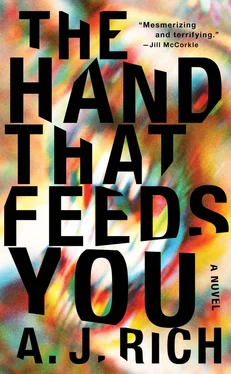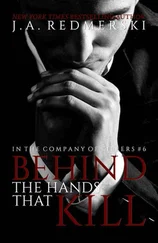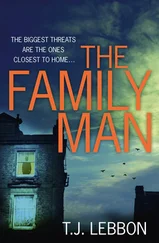“They might be listening.”
“Is Billie with you?”
“I’m at the precinct in East Harlem. Billie’s in the hospital.”
“Tell me you’re okay.”
“I’m handcuffed to a table in an interrogation room.”
“Make sense.”
“I understand more right now than I have in the last six months. They haven’t charged me yet, but I think I’m being held as a cop killer.”
“Don’t say anything until I get there.”
Before hanging up, I asked Steven to let McKenzie know, too.
The detectives took the phone with them when they left me in the interrogation room. They left the roll of paper towels, and knowing my brother would be coming for me, I tore off a large wad and started cleaning up the floor, in case he was brought to this room.
By the time I’d left a mound of wet paper towels under the table, the detectives were back, announcing that they were taking me to Central Booking.
“But my brother is coming here.”
“Tell him to call you a lawyer.”
“He is a lawyer.”
“He’ll have to go downtown to see you” is all the detective offered.
I rode in a squad car with the two detectives who’d questioned me. I remembered the day at John Jay that the professor had brought in a Yelp one-star review of Central Booking. I loved that such a thing existed, and when the professor read it aloud, the class went nuts: “Let me start off by saying… Yo myyyy niggggggaaaaa!!!!! I came out that fucker speaking Ebonics. I am college educated, yeah, that don’t mean shit. I manage a pharmaceutical company. I deal with hundreds of professional people in health care who have MDs, PhDs, and degrees in shit I can’t even pronounce. The word nigga this, nigga that, nigga who, nigga what. That’s all I fucking heard.”
Yes, I had memorized it, it was that vivid. Maybe I’d be writing my own.
We cut across Chinatown to the two gray, windowless buildings on White Street — the courthouse and the Tombs, connected by a three-story-high, windowless walkway. Richard Haas’s mural Immigration on the Lower East Side runs across the facade of the detention center. The irony is that its placement seems to send the immigrants straight to jail.
I was processed in the manner known to anyone who watches TV crime shows. But it was one thing to have watched from the comfort of one’s couch, eating chocolate, and another to be strip-searched in Central Booking. I was escorted to a cell where, to my relief, I was the only occupant. So far. I could hear trash-talking female prisoners nearby, but I couldn’t see them. And then a chorus of “Yo — CO!” that went unheeded. The place was freezing. Had I heard that the Tombs was kept at forty degrees?
I should be able to prove that Billie brought the two Dogos Argentinos into the shelter. I should be able to prove that she was in my house the morning Bennett was killed — it was there in Libertine’s e-mails, the e-mails that also proved she killed Susan Rorke and Samantha. But do e-mails constitute proof?
I figured I had a few hours until morning. I had been made to voucher my watch, but it must have been at least 3:00 a.m. The metal bench I sat on was so slippery that I nearly slid off it. Sleeping was out of the question. This was the poet’s “dark night of the soul.” The first thought to slay me was that I was responsible for a man’s death, and the serious injury of another. The blame game did no one any good, as Billie said, but there it was. I read some of the graffiti on the cell walls. Never pick up a dead man’s gun. Forgive me, but I have little choice in these matters. Do whatever you think is in your best interests.
I was treated to an argument from one of the bull pens. Two women fighting about who would get the phone next.
My thoughts went from logical and practical concerns to images and feelings I never wanted to confront again. I actually felt the moment I “snapped to” and found that I was sitting on the floor of the cell, hunched up in the position I took in my bathtub after finding Bennett’s body. I knew what was happening to me: a version of post-traumatic stress. I had just seen a man killed by dogs for the second time. I made myself take deep breaths to try to avoid hyperventilating and to slow my pulse. I made myself envision peaceful scenes of the sea — white-sand beaches, floating in aquamarine water the same temperature as my skin. But even my go-to vision failed — the warm water felt like blood.
I stood and paced the cell. I remembered a story that Steven had told me when he came home from Afghanistan. While visiting a prison, he noticed an isolated cell at the end of a dank hallway. He looked through the tiny hole in the door and saw a young girl, maybe thirteen years old, lying in a heap facing the door with a blank stare, nothing else in the cell but a cot. No sink or toilet. He asked his interpreter to ask the warden what she was in jail for. The warden explained that her father had brought her there because she’d run away with her boyfriend and their families caught them, and then they ran away again. Steven asked why she had no water and why she was kept so isolated — wasn’t that cruel? The warden said yes, he felt bad for her, but he had no female prison guards to take care of her. The girl was going crazy from this, Steven could see; he reported it to the US embassy, and they eventually negotiated her release.
It was quiet now; the women’s argument about the phone had stopped. No COs were present. I was in the Tombs — buried alive.
This night would either dismantle me or show me what I was made of. Another person might find herself galvanized by the extremity of the situation, find herself searching for what she might have missed that led to one cop’s death and another’s mauling. Go over every opportunity to have stopped Billie, to have prevented the carnage. But that would not change what had happened.
I sat on the floor, leaning against a wall, and the first lines of an Emily Dickinson poem came to me: “After great pain, a formal feeling comes— / The Nerves sit ceremonious, like Tombs—” Of course that was why it came to me there.
That was the last thought I had until I was awakened by the sound of keys, and a CO saying, “When I call your name, step out, shut up. You’re going into court. Don’t say a word. Don’t motion to anyone in the court. Just sit, look straight ahead, until they call your name.”
Half a dozen names were called, but not mine.
Two cops came for me about ten minutes later. My wrists were handcuffed and secured to a belt around my waist. I was driven to the Criminal Courthouse, less than a hundred yards away, for the traditional “perp walk” up the granite steps.
Once the squad car pulled up, a swarm of reporters with cameras and microphones were waiting for me. I was led past the press into the courthouse. I was taken on an elevator up to the fourth floor, to a small booth off a holding cell where Steven was waiting. The cops left me alone with my brother.
“Fucking unbelievable.” Steven hugged me and kissed my forehead.
At his touch, I started to cry. “What happens now?”
“They’re going to charge you with murder. Of a cop.”
“But the dogs were Billie’s. I was the target, not the cop.”
“Listen, we only have a few minutes. I’m going to ask for bail, but we can’t count on it.”
“What about the second cop? Is he going to be okay?”
“He’s in ICU at Columbia Presbyterian. He’s expected to survive.”
“Not to sound self-serving, but will he be able to talk soon? Maybe he saw what really happened.”
“You’ll know when I know.”
“Is that where Billie is?”
“She was released this morning. It was just a flesh wound. Her grandmother took her home.”
Читать дальше

![Корнелл Вулрич - Eyes That Watch You [= The Case of the Talking Eyes]](/books/32103/kornell-vulrich-eyes-that-watch-you-the-case-of-thumb.webp)









